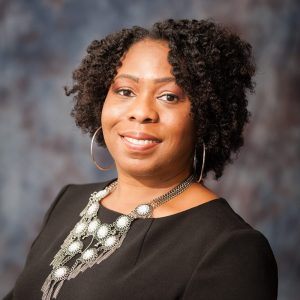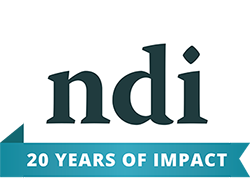By Shajira Brown, Manager, Equity and Inclusion, National Disability Institute
Picture this…it’s a beautiful Sunday morning and all is well in your household. Your spouse is at the computer and your child is still in bed. You decide to start prepping your Sunday meal and, in a split-second, everything changes. This is how that change affected by family. My husband, who was sitting having fun on his computer, is now on the floor in chronic pain screaming at the top of his lungs, “Babe, it hurts so bad – I think I am having a crisis.” In short, he is having what’s called a sickle cell crisis.
My husband is one of the 100,000 Americans who suffers from sickle cell disease (SCD). SCD is a genetic disorder of the red blood cell. Red blood cells are extremely important because they carry oxygen to all body parts. A healthy red blood cell is circular shape, but for those with SCD or SCT, it’s more C-shaped, like a sickle. This unique cell shape limits blood flow and oxygen to your organs and can cause severe physical discomfort. Experiencing my husband, who is otherwise healthy, suffer with excruciating pain that practically paralyzes him from one moment to the next, is heart wrenching. He can barely say a word, he is balled up and cannot be moved. Each movement, even the gentlest touch, all result in him screaming in agony.
Why am I sharing something so personal? Easy answer, I want to bring awareness around this disorder, because it disproportionately affects the African American community more than any other race. According to the Center for Disease Control and Prevention (CDC), 1 in 365 African Americans are born with SCD and about 1 in 13 African Americans are born with sickle cell trait (SCT). Complications of sickle cell disease (not SCT) can result in needing a blood transfusion, stroke, organ damage, acute chest syndrome, other disabilities and, at times, premature death. Not everyone who is diagnosed with sickle cell disease is considered or eligible for disability, my husband being one of them. However, there are so many people – especially African Americans who live in chronic pain daily and experience crises often, who need around the clock care and are classified as disabled.
Why this story for Black History Month? Another easy answer – because I need your help. For a number of reasons, there is a shortage of blood donations, COVID-19 being at the top. If you would like to help the African American community, donate blood. If you work in health care, train your staff on how to handle those coming into the hospital due to a crisis. If you are not sure if you have sickle cell trait, please get tested.
I am happy to report that my husband’s last crisis episode was in 2019, where he was admitted into the hospital for eight days. As we all know, hospitalization costs are extremely expensive. A SCD patient’s average monthly cost can be upwards of $1,400. In a lifetime, that cost can be as much as $460,151, and the price goes up depending on age. We were fortunate to have good insurance, which paid for the majority of the bill, but we also had a specific savings account that we used to assist us with the remainder.
If you are someone with SCD and on disability, you may want to consider opening an ABLE account. An ABLE account is a state-run savings program for eligible people with disabilities in the United States. If you would like assistance in building your financial resilience, and learn how to navigate through difficult financial times, there are tools to help you on the Financial Resilience Center.
In 2021, my husband and I welcomed another child who has sickle cell trait. Although we donate blood annually, we made the decision to make it our family tradition to donate during Black History Month. This is our way of helping my husband and anyone else who may need it. It would be amazing if you would join me in making this your tradition as well.
Learn more about sickle cell disease:
CDC Fact sheet explaining those with SCT can donate blood
Center for Disease Control and Prevention (CDC) Sickle Cell Disease Page
American Blood Cross Blood Service Page
Shajira Brown has more than 10 years of experience working in the Human Services  field. She has a strong background working with people with disabilities, the homeless, TANF and underemployed populations. Shajira has held a host of positions throughout her career, which include: Manager of Special Projects and Executive Support, Manager of Supportive Services, Vocational Specialist, Case Manager, Retentions Specialist and Psychiatric Rehabilitation Worker. To make a true impact, she specializes in Program/Project Development and Workforce Development to streamline and advocate for better services for underrepresented populations. Shajira received her undergraduate degree in Professional Studies from CUNY-Medgar Evers College and her graduate degree in Public Administration from University of Baltimore.
field. She has a strong background working with people with disabilities, the homeless, TANF and underemployed populations. Shajira has held a host of positions throughout her career, which include: Manager of Special Projects and Executive Support, Manager of Supportive Services, Vocational Specialist, Case Manager, Retentions Specialist and Psychiatric Rehabilitation Worker. To make a true impact, she specializes in Program/Project Development and Workforce Development to streamline and advocate for better services for underrepresented populations. Shajira received her undergraduate degree in Professional Studies from CUNY-Medgar Evers College and her graduate degree in Public Administration from University of Baltimore.



